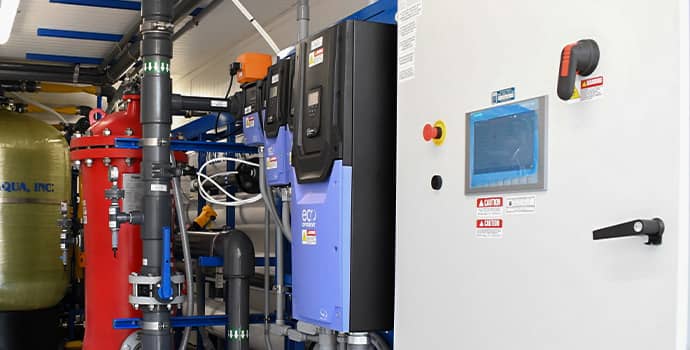Water treatment systems operate under precise conditions to ensure efficiency, safety, and regulatory compliance. Alarms and warnings serve as an essential safeguard, alerting operators to potential system failures, parameter deviations, or maintenance needs before they become critical.
At Aqua Components LLC, we design advanced alarm and warning systems that integrate real-time monitoring, automatic shutdown protocols, and remote notifications. These features help prevent equipment failures, protect water quality, and reduce downtime.
This guide explores the types of alarms and warnings in water treatment, how they function, and the benefits of a well-integrated alarm system for operational efficiency and safety.
Why Alarms & Warnings Are Critical in Water Treatment Systems
✅ 1. Prevents Costly System Failures
✔ Early detection of pressure fluctuations, flow irregularities, or chemical dosing errors helps prevent membrane damage, pump failures, and component wear.
✅ 2. Ensures Consistent Water Quality
✔ Alerts for TDS spikes, pH imbalances, or contamination risks ensure that only water meeting quality standards is distributed.
✅ 3. Minimizes Downtime & Emergency Repairs
✔ Operators can address minor issues before they escalate, reducing unplanned maintenance and costly shutdowns.
✅ 4. Supports Regulatory Compliance
✔ Industries must meet EPA, NSF, and WHO standards for water quality and safety. Alarm systems help facilities stay within regulatory limits and avoid violations.
Types of Alarms & Warnings in Water Treatment Systems
🔹 1. Flow Rate & Pressure Alarms
✔ Low Flow Rate Warning: Indicates clogged filters or pump malfunctions.
✔ High Flow Rate Alarm: May indicate a valve failure or system leak.
✔ High & Low Pressure Alarms: Prevents pump cavitation or excessive strain on membranes.
🔹 2. Chemical Dosing & Tank Level Alarms
✔ Low Chemical Tank Warning: Alerts operators to refill chemical tanks before depletion.
✔ Overdosing Alarm: Prevents excessive chemical injection that could affect water quality.
✔ Pump Failure Alarm: Detects dosing pump malfunctions.
🔹 3. Water Quality & Sensor Alarms
✔ TDS Out-of-Range Warning: Prevents contaminated water from entering distribution.
✔ pH Imbalance Alarm: Ensures safe water for consumption or industrial use.
✔ ORP (Oxidation-Reduction Potential) Alarm: Detects disinfection inefficiencies.
🔹 4. Temperature & Power Supply Alarms
✔ Overheating Warning: Protects system components from thermal damage.
✔ Power Failure Alarm: Notifies operators of outages affecting treatment processes.
🔹 5. Filter & Membrane Maintenance Warnings
✔ Filter Replacement Reminder: Based on runtime or pressure drop.
✔ RO Membrane Cleaning Alert: Signals when scaling or fouling affects performance.
📞 Looking for a smart alarm system for your water treatment plant? Contact us today!
How Alarms & Warnings Function in Water Treatment Systems
🔹 1. Real-Time Monitoring & Sensor Data Collection
✔ Sensors continuously measure flow, pressure, conductivity, and chemical dosing levels.
✔ Thresholds are programmed based on system specifications and regulatory requirements.
🔹 2. Alarm Activation & Automatic Response
✔ When a parameter exceeds the pre-set limit, an alarm is triggered.
✔ The system may issue a warning, adjust parameters, or initiate a controlled shutdown.
🔹 3. Remote Notifications & Operator Alerts
✔ Operators receive alerts via control panels, SMS, email, or IoT dashboards.
✔ Integrated alarm logs track historical system data for analysis and compliance reporting.
Advanced Alarm Features for Smart Water Treatment Systems
1. IoT-Enabled Alarm Systems
✔ Cloud-based notifications for remote monitoring.
✔ AI-based predictive alarms that detect potential failures before they occur.
2. Automatic Shutdown & Safety Interlocks
✔ Protects pumps, membranes, and pipelines from damage.
✔ Prevents untreated or contaminated water from entering distribution.
3. Customizable Alarm Thresholds
✔ Operators can adjust alarm sensitivity levels based on site-specific requirements.
✔ Critical alarms can trigger immediate shutdowns, while minor alerts prompt warnings.
Applications of Alarms & Warnings in Water Treatment
🔹 1. Industrial Water Treatment Plants
✔ Ensures consistent water quality for manufacturing, power plants, and cooling towers.
✔ Prevents membrane fouling, scaling, and corrosion-related failures.
🔹 2. Municipal & Wastewater Treatment
✔ Ensures safe drinking water production by detecting contaminants.
✔ Prevents non-compliant wastewater discharge by alerting operators to quality deviations.
🔹 3. Food & Beverage Processing
✔ Ensures high-purity water standards for beverage production and food safety.
✔ Prevents microbial contamination with real-time disinfection alarms.
The Benefits of a Smart Water Treatment Alarm System
✅ 1. Reduces Equipment Damage & Maintenance Costs
✔ Prevents overpressure, dry running, and premature component failure.
✅ 2. Enhances Operational Safety & Reliability
✔ Ensures operators receive real-time notifications for immediate action.
✅ 3. Improves Water Quality Control
✔ Prevents contamination risks and regulatory violations.
✅ 4. Provides Predictive Maintenance & Data Logging
✔ Historical alarm logs help operators optimize system efficiency.
📞 Need a custom alarm system for your water treatment facility? Contact our team today!
FAQs About Alarms & Warnings in Water Treatment Systems
Q1: What happens if an alarm is triggered?
✅ The system will either notify the operator, adjust settings automatically, or shut down if a critical issue occurs.
Q2: Can alarms be customized based on specific site requirements?
✅ Yes! Thresholds and response actions can be programmed for different industries and processes.
Q3: Do alarm systems require regular maintenance?
✅ Periodic calibration of sensors and controllers ensures accurate alarm functionality.
📞 Have more questions? Contact us for expert guidance!
Conclusion
A well-integrated alarm and warning system is crucial for maintaining water treatment efficiency, safety, and compliance. Whether monitoring flow rates, pressure levels, or chemical dosing, smart alarms ensure that operators can respond to issues before they escalate, preventing costly downtime and equipment failures.
💡 Key Takeaways:
✔ Alarms protect water treatment systems from damage and inefficiencies.
✔ Smart automation allows remote monitoring and predictive maintenance.
✔ Custom alarm settings help operators prevent downtime and regulatory violations.
✔ IoT-enabled alerts enhance operational safety and efficiency.
📞 Contact Aqua Components LLC today for custom alarm system integration and water treatment monitoring solutions!

